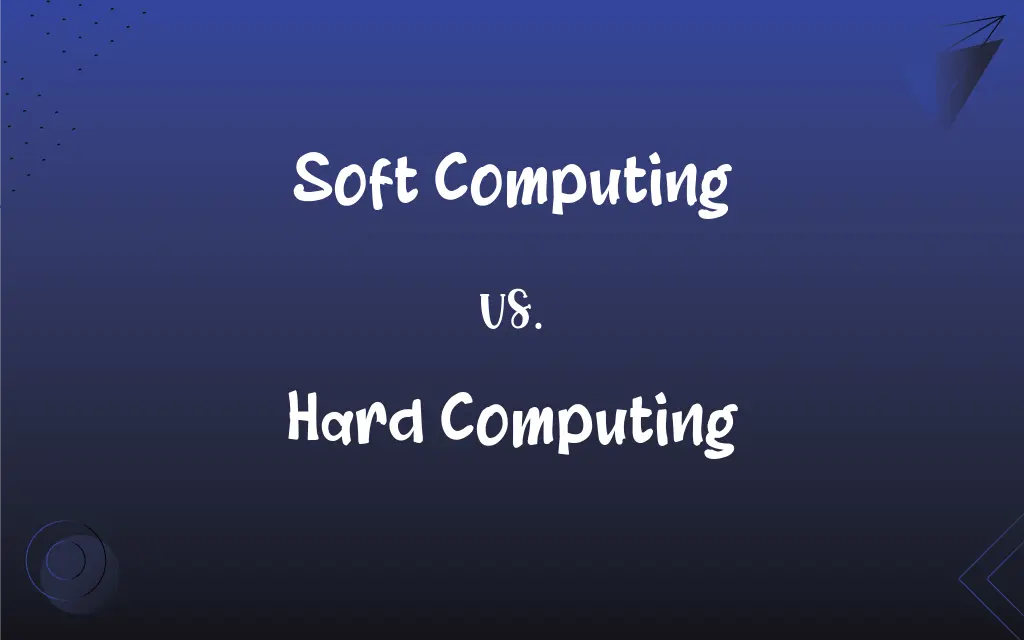Soft Computing vs. Hard Computing: What's the Difference?
Edited by Aimie Carlson || By Harlon Moss || Published on March 2, 2024
Soft computing is an approach in computing that approximates human reasoning by tolerating imprecision and uncertainty, whereas hard computing relies on precise models and exact algorithms to solve problems.

Key Differences
Soft computing encompasses techniques that model human cognitive abilities like learning, adaptation, and decision-making under uncertainty. It includes methods like fuzzy logic, neural networks, and genetic algorithms. Hard computing, in contrast, is based on traditional computer science approaches that require exact, deterministic algorithms and precise numerical solutions.
The philosophy of soft computing is to exploit the tolerance for imprecision, partial truth, and approximation, making it well-suited for complex, real-world problems. Hard computing, on the other hand, adheres to strict binary logic and precise calculations, making it suitable for problems that are well-defined and have exact solutions.
Soft computing approaches are inherently flexible, allowing them to handle ambiguous or noisy data effectively. This flexibility is not present in hard computing, which demands precise inputs and offers exact outputs, often not tolerable to ambiguous or incomplete data.
In terms of application, soft computing is often used in areas like artificial intelligence, machine learning, and data mining, where human-like reasoning is beneficial. Hard computing finds its application in areas requiring rigorous, exact computations like system programming, algorithmic design, and hardware development.
The strength of soft computing lies in its ability to provide approximate but useful and quick solutions to complex problems. Hard computing, conversely, excels in situations where the problem can be precisely modeled and requires an exact solution.
ADVERTISEMENT
Comparison Chart
Approach
Approximates human reasoning, tolerates imprecision
Relies on exact algorithms and precise models
Techniques
Fuzzy logic, neural networks, genetic algorithms
Binary logic, deterministic algorithms
Suitability
Complex, real-world problems with uncertainty
Well-defined problems with exact solutions
Flexibility
High, can handle ambiguous data
Low, requires precise inputs
Application Examples
Artificial intelligence, machine learning
System programming, algorithmic design
ADVERTISEMENT
Soft Computing and Hard Computing Definitions
Soft Computing
Incorporates neural networks for learning.
Neural networks in soft computing enable machines to learn from data.
Hard Computing
Employs strict binary logic.
Binary logic, a cornerstone of hard computing, governs digital circuits.
Soft Computing
Handles partial truths and approximations.
Soft computing is ideal for financial forecasting with uncertain data.
Hard Computing
Computing based on precise algorithms.
Hard computing methods are used in developing computer software.
Soft Computing
A computing approach that mimics human reasoning.
Soft computing techniques are used in AI to mimic human decision-making.
Hard Computing
Unsuitable for imprecise data.
Hard computing can't effectively process the imprecise data in natural language processing.
Soft Computing
Utilizes fuzzy logic for imprecise problems.
Fuzzy logic, a form of soft computing, is applied in traffic control systems.
Hard Computing
Used in deterministic problem solving.
Algorithm design, an area of hard computing, requires deterministic solutions.
Soft Computing
Adapts through genetic algorithms.
Soft computing uses genetic algorithms for optimization problems.
Hard Computing
Demands exact numerical solutions.
Hard computing is essential in numerical simulations for engineering.
FAQs
What defines hard computing?
Computing based on precise, deterministic algorithms and exact solutions.
Can hard computing handle fuzzy logic?
No, hard computing operates on strict binary logic and exactness.
Is soft computing better than hard computing?
It depends on the application; soft computing is better for approximation, while hard computing excels in precision.
What is soft computing?
An approach in computing that tolerates imprecision and approximates human reasoning.
Where is soft computing most effective?
In complex, real-world scenarios with uncertain or imprecise data.
Does hard computing require more computational power?
Not necessarily, but it depends on the complexity of the exact algorithms used.
What are some examples of soft computing techniques?
Techniques include neural networks, fuzzy logic, and genetic algorithms.
What are the limitations of hard computing?
It cannot efficiently solve problems that are imprecise or lack exact solutions.
How does soft computing mimic human decision-making?
By using methods that are tolerant to imprecision and uncertainty, similar to human reasoning.
Is soft computing useful in AI development?
Yes, it's particularly beneficial in AI for handling complex, uncertain scenarios.
Are neural networks a part of hard computing?
No, they are typically considered a part of soft computing.
Can hard computing be used in data mining?
While possible, soft computing is generally more effective in data mining due to its flexibility.
Can hard computing solve all types of mathematical problems?
Only those that can be precisely defined and have deterministic solutions.
Is soft computing more suited to real-time applications?
Yes, due to its ability to handle imprecision and provide quick, approximate solutions.
Are genetic algorithms exclusive to soft computing?
Yes, they are a key component of soft computing methodologies.
How does soft computing handle uncertainty?
By using techniques like fuzzy logic that are designed to work with uncertainty and partial truths.
Are there hybrid approaches combining soft and hard computing?
Yes, some complex systems use a hybrid approach for better efficiency and precision.
Do both soft and hard computing use the same programming languages?
They can use similar languages, but the approaches and methodologies differ.
Is soft computing useful in robotics?
Yes, especially in adaptive and intelligent robotic systems.
Does hard computing have a role in machine learning?
Yes, in aspects that require precise calculations and deterministic algorithms.
About Author
Written by
Harlon MossHarlon is a seasoned quality moderator and accomplished content writer for Difference Wiki. An alumnus of the prestigious University of California, he earned his degree in Computer Science. Leveraging his academic background, Harlon brings a meticulous and informed perspective to his work, ensuring content accuracy and excellence.
Edited by
Aimie CarlsonAimie Carlson, holding a master's degree in English literature, is a fervent English language enthusiast. She lends her writing talents to Difference Wiki, a prominent website that specializes in comparisons, offering readers insightful analyses that both captivate and inform.
































































